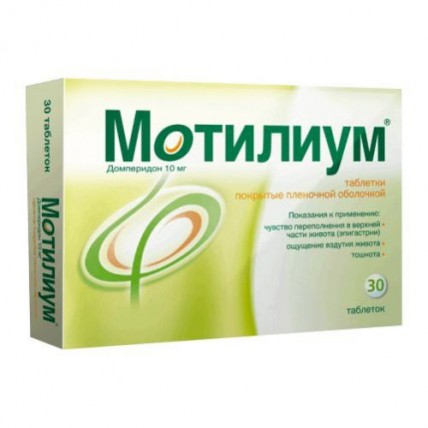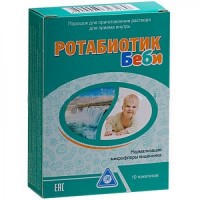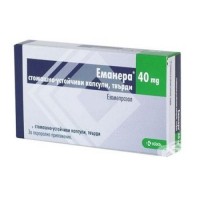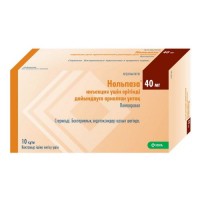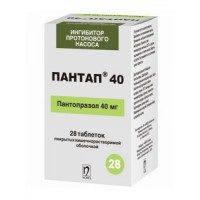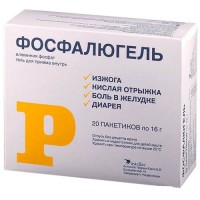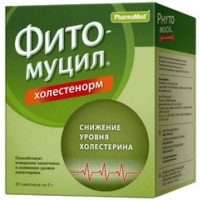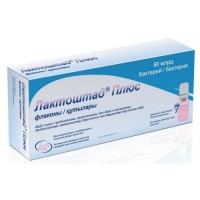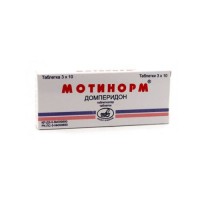Motilium 30s 10 mg coated tablets
- $32.20
The instruction for medical use
of MOTILIUM medicine
the Trade name
of the drug Motilium Mezhdunarodnoye the unlicensed
name Domperidon Lekarstvennaya
the Tablet form, film coated 10 mg
Structure
One tablet contains
active agent domperidon 10.00,
excipients: lactoses monohydrate, starch corn, cellulose microcrystalline, starch prezhelatinizirovanny, PVP K90, magnesium stearate, cotton of seeds the oil hydrogenated sodium lauryl sulfate,
a film cover: a gipromelloza of 2950 5 мПа·с, sodium laurylsulphite,
water purified.
The description
Round biconvex tablets, film coated, from white till pale cream color, with the inscription Janssen on one party of a tablet and M/10 on another.
Pharmacotherapeutic group
Drugs for treatment of functional disorders of intestines. Stimulators of motility of a GIT.
The code of automatic telephone exchange A03FA03
the Pharmacological
Pharmacokinetics Domperidon properties is quickly absorbed at oral administration on an empty stomach, the maximum concentration in blood plasma are noted approximately within 1 hour. At administration of drug after a meal the absorption of a domperidon slows down, and the area under curve (AUC) increases. Low absolute biological availability of a domperidon (about 15%) is caused by extensive primary metabolism in a wall of intestines and liver.
The Gipoatsidnost of gastric juice reduces absorption of a domperidon.
Time of achievement of the maximum concentration of a domperidon in blood plasma is 90 min. after administration of drug. At the same time the maximum concentration of Cmax equals 18 ng/ml after single dose and 21 ng/ml at daily administration of drug on 30 mg a day within 2 weeks.
Domperidon for 91-93% contacts proteins of blood plasma. Concentration of a domperidon in breast milk of the feeding women are 4 times lower, than the corresponding concentration in blood plasma. Domperidon badly gets through a blood-brain barrier.
Domperidon is metabolized in a liver by hydroxylation and N-dealkylation. Removal with urine and a stake makes 31 and 66% of
an oral dose, respectively. Drug discharge in not changed look makes small percent (10% - with a stake and about 1% - with urine). Domperidon does not kumulirutsya and does not induce own exchange. Plasma elimination half-life of blood after reception of a single dose makes 7-9 hours and is extended in a heavy renal failure (20.8 h).
The pharmacodynamics
Motilium is an antagonist of dopamine, has antiemetic property. Its antiemetic action is caused by a combination of peripheral (gastrokinetichesky) action and antagonism to dopamine receptors in a trigger zone of chemoceptors.
At intake Motilium increases duration of reductions of antral and duodenal departments of a stomach, accelerates its depletion and increases pressure in a sphincter of a lower part of a gullet. Motilium
has no effect on gastric secretion.
Motilium's use seldom is followed by extrapyramidal side effects, but Motilium stimulates prolactin discharge from a hypophysis.
Indications
- the complex of dispepsichesky symptoms which is often associated with the slowed-down gastric emptying, a gastroesophagal reflux, an esophagitis: the feeling of overflow in epigastriums, feeling of an abdominal distension, pain in an upper part of a stomach, an eructation, heartburn, a meteorism
- the nausea and vomiting of functional, organic, infectious origin caused by radiotheraphy, medicinal therapy or disturbance of a diet
- the nausea and vomiting caused by dopamine agonists in case of their use in Parkinson's disease (such as L-dopa and Bromocriptinum)
- cyclic vomiting, a gastroesophagal reflux, a syndrome of vomiting and other disturbances of motility of a stomach in pediatric practice
the Route of administration and doses
Is recommended to take the pill Motilium to food, in case of their reception after a meal the absorption of a domperidon can slow down.
Chronic dyspepsia
Adults and teenagers is more senior than 12 years:
On 1-2 tablet 3 or 4 of time a day. Maximum daily dose of 80 mg.
Children aged from 6 up to 12 years:
1 tablet 3 or 4 of time a day. The maximum daily dose - 80 mg.
Nausea and vomiting
Adults and teenagers are more senior than 12 years:
On 1-2 tablet 3 or 4 of time a day. Maximum daily dose of 80 mg.
Children aged from 6 up to 12 years:
1 tablet 3-4 times a day. The maximum daily dose - 80 mg.
The maximum daily dose of a domperidon of 2.4 mg on 1 kg of body weight, but no more than 40 mg.
Treatment duration on average 1 month.
In a renal failure the reduction of frequency of administration of drug is recommended (see the section Special instructions).
Side effects
Often
- gastrointestinal disorders (nausea, vomiting, disturbance of appetite, etc.)
- passing enterospasms in some cases
- the extrapyramidal phenomena (at children - it is very rare, adults have isolated cases), these phenomena are completely reversible and disappear after the termination of administration of drug
Seldom
- a galactorrhoea, a gynecomastia and amenoremya because of increase in level of prolactin in blood plasma caused by the fact that the hypophysis is out of a blood-brain barrier
Very seldom
- (& lt, 1/10000, including isolated cases) a Quincke's disease and anaphylactic reactions, including an acute anaphylaxis, allergic reactions, a small tortoiseshell.
Contraindications
- the increased intolerance of drug and its components
- prolactin - the cosecreting tumor of a hypophysis (prolaktinom)
- a concomitant use of oral forms of a ketokonazol, erythromycin or other strong inhibitors of an isoenzyme CYP3A4 (flukonazol, vorikonazol, klaritromitsin, Amiodaronum and telitromitsin)
- gastrointestinal bleedings, mechanical impassability or perforation (i.e. when stimulation of motive function of a stomach can be dangerous)
- children's age up to 6 years
- the lactation period
Medicinal interactions
Anticholinergic drugs can neutralize Motilium's action. Oral biological availability of Motilium decreases after the previous intake of Cimetidinum or sodium bicarbonate. It is not necessary to take the antiacid and anti-secretory drugs along with Motilium as they reduce its biological availability after intake.
The main way of metabolic transformations of a domperidon - through CYP3A4. The concomitant use of Motilium with the medicines considerably inhibiting this enzyme can cause increase in level of a domperidon in blood plasma - antifungal drugs of an azolovy row (flukonazol, itrakonazol, ketokonazol, vorikonazol), antibiotics from group of macroleads (klaritromitsin, erythromycin), HIV protease inhibitors (amprenavir, atazanavir, fosamprenavir, ndinavir, nelfinavir, ritonavir, sakhinavir), nefazodon, antagonists of calcium (diltiazem, verapamil), Amiodaronum, an aprepitant, telitromitsin.
Ketokonazol inhibits CYP3A4 - dependent primary metabolism of a domperidon therefore approximately triple increase in the maximum concentration of a domperidon and AUC in a plateau phase is reached.
At combined use of Motilium in a dose of 10 mg 4 times a day and a ketokonazol in a dose of 200 mg 2 times a day are observed lengthening of an interval of QT on 10-20 ms, at monotherapy by Motilium clinically significant changes of an interval of QT were not noted.
Primeneniye Motilium at patients against the background of intake of paracetamol or the picked-up therapy with digoxin did not influence the level of these drugs in blood. Motilium can be combined also with neuroleptics which action he does not strengthen, agonists of dofaminergichesky receptors (Bromocriptinum, L-finish singing) which undesirable peripheral effects, such as digestion disturbances, nausea, vomiting, he suppresses, without neutralizing their main properties.
Special instructions
At the combined use of Motilium with antiacid or anti-secretory drugs the last should be accepted after a meal.
Primeneniye in pediatrics.
The Motilium's tablets are shown only for adults and children with body weight more than 35 kg (the age is more senior than 6 years), in children's practice generally it is necessary to use
Motilium Primeneniye suspension in diseases of a liver
Considering high extent of metabolism of a domperidon in a liver, it is necessary to appoint with care Motilium the patient with a liver failure.
Primeneniye in diseases of kidneys
At patients with a heavy renal failure (serumal creatinine & gt, 6 mg/100 ml, i.e. & gt, 0.6 mmol/l) elimination half-life of a domperidon increased from 7.4 to 20.8 o'clock, but concentration of drug in blood plasma were lower. As very small percent of drug is removed by kidneys in not changed look therefore correction of a single dose with a renal failure is not required from patients. However at repeated prescribing of drug the frequency of introduction has to be reduced to one or two times a day. At long therapy the patients have to be under regular observation.
Pregnancy
of Data on use of a domperidon during pregnancy is not enough. Motilium it is necessary to appoint at pregnancy perhaps only when the expected advantage for mother exceeds potential risk for a fruit.
Feature of influence of medicine on ability to run the vehicle or potentially dangerous by mechanisms
Motilium does not make impact on ability to drive the car and to work with the equipment.
Overdose
Symptoms: drowsiness, a disorientation and extrapyramidal reactions, especially at children.
Treatment: use of activated carbon and careful observation is recommended. At emergence of extrapyramidal reactions it is possible to appoint anticholinergics, the antihistaminic drugs, drugs used for treatment of parkinsonism.
Forms of release and packing
On 30 tablets place in blister strip packagings from PVC and aluminum foil.
On 1 planimetric packing together with the instruction for medical use in the state and Russian languages place in a cardboard pack.
To Store storage conditions in the dry place at a temperature from 15 of 0C up to 30 0C.
To store out of children's reach!
Not to apply a period of storage of 5 years after an expiration date.
Prescription status
Without prescription
the Producer Janssen Silag S.A., Camille Demoulen St., TSA 91003, 92787 of Issi Le Moulinl Sedex 9, France.
The name and the country of the organization packer
Janssen-Silag S.A., France
the Name and the country of the owner of the registration certificate
of LLC Johnson & Johnson, the Russian Federation
the Address of the organization accepting in the territory of the Republic of Kazakhstan claims from consumers on quality of products (goods)
of LLC Johnson & Johnson,
Russia, 121614, Moscow, Krylatskaya St., 17, building 2,
ph. (495) 726-55-55
To develop
of MOTILIUM medicine
the Trade name
of the drug Motilium Mezhdunarodnoye the unlicensed
name Domperidon Lekarstvennaya
the Tablet form, film coated 10 mg
Structure
One tablet contains
active agent domperidon 10.00,
excipients: lactoses monohydrate, starch corn, cellulose microcrystalline, starch prezhelatinizirovanny, PVP K90, magnesium stearate, cotton of seeds the oil hydrogenated sodium lauryl sulfate,
a film cover: a gipromelloza of 2950 5 мПа·с, sodium laurylsulphite,
water purified.
The description
Round biconvex tablets, film coated, from white till pale cream color, with the inscription Janssen on one party of a tablet and M/10 on another.
Pharmacotherapeutic group
Drugs for treatment of functional disorders of intestines. Stimulators of motility of a GIT.
The code of automatic telephone exchange A03FA03
the Pharmacological
Pharmacokinetics Domperidon properties is quickly absorbed at oral administration on an empty stomach, the maximum concentration in blood plasma are noted approximately within 1 hour. At administration of drug after a meal the absorption of a domperidon slows down, and the area under curve (AUC) increases. Low absolute biological availability of a domperidon (about 15%) is caused by extensive primary metabolism in a wall of intestines and liver.
The Gipoatsidnost of gastric juice reduces absorption of a domperidon.
Time of achievement of the maximum concentration of a domperidon in blood plasma is 90 min. after administration of drug. At the same time the maximum concentration of Cmax equals 18 ng/ml after single dose and 21 ng/ml at daily administration of drug on 30 mg a day within 2 weeks.
Domperidon for 91-93% contacts proteins of blood plasma. Concentration of a domperidon in breast milk of the feeding women are 4 times lower, than the corresponding concentration in blood plasma. Domperidon badly gets through a blood-brain barrier.
Domperidon is metabolized in a liver by hydroxylation and N-dealkylation. Removal with urine and a stake makes 31 and 66% of
an oral dose, respectively. Drug discharge in not changed look makes small percent (10% - with a stake and about 1% - with urine). Domperidon does not kumulirutsya and does not induce own exchange. Plasma elimination half-life of blood after reception of a single dose makes 7-9 hours and is extended in a heavy renal failure (20.8 h).
The pharmacodynamics
Motilium is an antagonist of dopamine, has antiemetic property. Its antiemetic action is caused by a combination of peripheral (gastrokinetichesky) action and antagonism to dopamine receptors in a trigger zone of chemoceptors.
At intake Motilium increases duration of reductions of antral and duodenal departments of a stomach, accelerates its depletion and increases pressure in a sphincter of a lower part of a gullet. Motilium
has no effect on gastric secretion.
Motilium's use seldom is followed by extrapyramidal side effects, but Motilium stimulates prolactin discharge from a hypophysis.
Indications
- the complex of dispepsichesky symptoms which is often associated with the slowed-down gastric emptying, a gastroesophagal reflux, an esophagitis: the feeling of overflow in epigastriums, feeling of an abdominal distension, pain in an upper part of a stomach, an eructation, heartburn, a meteorism
- the nausea and vomiting of functional, organic, infectious origin caused by radiotheraphy, medicinal therapy or disturbance of a diet
- the nausea and vomiting caused by dopamine agonists in case of their use in Parkinson's disease (such as L-dopa and Bromocriptinum)
- cyclic vomiting, a gastroesophagal reflux, a syndrome of vomiting and other disturbances of motility of a stomach in pediatric practice
the Route of administration and doses
Is recommended to take the pill Motilium to food, in case of their reception after a meal the absorption of a domperidon can slow down.
Chronic dyspepsia
Adults and teenagers is more senior than 12 years:
On 1-2 tablet 3 or 4 of time a day. Maximum daily dose of 80 mg.
Children aged from 6 up to 12 years:
1 tablet 3 or 4 of time a day. The maximum daily dose - 80 mg.
Nausea and vomiting
Adults and teenagers are more senior than 12 years:
On 1-2 tablet 3 or 4 of time a day. Maximum daily dose of 80 mg.
Children aged from 6 up to 12 years:
1 tablet 3-4 times a day. The maximum daily dose - 80 mg.
The maximum daily dose of a domperidon of 2.4 mg on 1 kg of body weight, but no more than 40 mg.
Treatment duration on average 1 month.
In a renal failure the reduction of frequency of administration of drug is recommended (see the section Special instructions).
Side effects
Often
- gastrointestinal disorders (nausea, vomiting, disturbance of appetite, etc.)
- passing enterospasms in some cases
- the extrapyramidal phenomena (at children - it is very rare, adults have isolated cases), these phenomena are completely reversible and disappear after the termination of administration of drug
Seldom
- a galactorrhoea, a gynecomastia and amenoremya because of increase in level of prolactin in blood plasma caused by the fact that the hypophysis is out of a blood-brain barrier
Very seldom
- (& lt, 1/10000, including isolated cases) a Quincke's disease and anaphylactic reactions, including an acute anaphylaxis, allergic reactions, a small tortoiseshell.
Contraindications
- the increased intolerance of drug and its components
- prolactin - the cosecreting tumor of a hypophysis (prolaktinom)
- a concomitant use of oral forms of a ketokonazol, erythromycin or other strong inhibitors of an isoenzyme CYP3A4 (flukonazol, vorikonazol, klaritromitsin, Amiodaronum and telitromitsin)
- gastrointestinal bleedings, mechanical impassability or perforation (i.e. when stimulation of motive function of a stomach can be dangerous)
- children's age up to 6 years
- the lactation period
Medicinal interactions
Anticholinergic drugs can neutralize Motilium's action. Oral biological availability of Motilium decreases after the previous intake of Cimetidinum or sodium bicarbonate. It is not necessary to take the antiacid and anti-secretory drugs along with Motilium as they reduce its biological availability after intake.
The main way of metabolic transformations of a domperidon - through CYP3A4. The concomitant use of Motilium with the medicines considerably inhibiting this enzyme can cause increase in level of a domperidon in blood plasma - antifungal drugs of an azolovy row (flukonazol, itrakonazol, ketokonazol, vorikonazol), antibiotics from group of macroleads (klaritromitsin, erythromycin), HIV protease inhibitors (amprenavir, atazanavir, fosamprenavir, ndinavir, nelfinavir, ritonavir, sakhinavir), nefazodon, antagonists of calcium (diltiazem, verapamil), Amiodaronum, an aprepitant, telitromitsin.
Ketokonazol inhibits CYP3A4 - dependent primary metabolism of a domperidon therefore approximately triple increase in the maximum concentration of a domperidon and AUC in a plateau phase is reached.
At combined use of Motilium in a dose of 10 mg 4 times a day and a ketokonazol in a dose of 200 mg 2 times a day are observed lengthening of an interval of QT on 10-20 ms, at monotherapy by Motilium clinically significant changes of an interval of QT were not noted.
Primeneniye Motilium at patients against the background of intake of paracetamol or the picked-up therapy with digoxin did not influence the level of these drugs in blood. Motilium can be combined also with neuroleptics which action he does not strengthen, agonists of dofaminergichesky receptors (Bromocriptinum, L-finish singing) which undesirable peripheral effects, such as digestion disturbances, nausea, vomiting, he suppresses, without neutralizing their main properties.
Special instructions
At the combined use of Motilium with antiacid or anti-secretory drugs the last should be accepted after a meal.
Primeneniye in pediatrics.
The Motilium's tablets are shown only for adults and children with body weight more than 35 kg (the age is more senior than 6 years), in children's practice generally it is necessary to use
Motilium Primeneniye suspension in diseases of a liver
Considering high extent of metabolism of a domperidon in a liver, it is necessary to appoint with care Motilium the patient with a liver failure.
Primeneniye in diseases of kidneys
At patients with a heavy renal failure (serumal creatinine & gt, 6 mg/100 ml, i.e. & gt, 0.6 mmol/l) elimination half-life of a domperidon increased from 7.4 to 20.8 o'clock, but concentration of drug in blood plasma were lower. As very small percent of drug is removed by kidneys in not changed look therefore correction of a single dose with a renal failure is not required from patients. However at repeated prescribing of drug the frequency of introduction has to be reduced to one or two times a day. At long therapy the patients have to be under regular observation.
Pregnancy
of Data on use of a domperidon during pregnancy is not enough. Motilium it is necessary to appoint at pregnancy perhaps only when the expected advantage for mother exceeds potential risk for a fruit.
Feature of influence of medicine on ability to run the vehicle or potentially dangerous by mechanisms
Motilium does not make impact on ability to drive the car and to work with the equipment.
Overdose
Symptoms: drowsiness, a disorientation and extrapyramidal reactions, especially at children.
Treatment: use of activated carbon and careful observation is recommended. At emergence of extrapyramidal reactions it is possible to appoint anticholinergics, the antihistaminic drugs, drugs used for treatment of parkinsonism.
Forms of release and packing
On 30 tablets place in blister strip packagings from PVC and aluminum foil.
On 1 planimetric packing together with the instruction for medical use in the state and Russian languages place in a cardboard pack.
To Store storage conditions in the dry place at a temperature from 15 of 0C up to 30 0C.
To store out of children's reach!
Not to apply a period of storage of 5 years after an expiration date.
Prescription status
Without prescription
the Producer Janssen Silag S.A., Camille Demoulen St., TSA 91003, 92787 of Issi Le Moulinl Sedex 9, France.
The name and the country of the organization packer
Janssen-Silag S.A., France
the Name and the country of the owner of the registration certificate
of LLC Johnson & Johnson, the Russian Federation
the Address of the organization accepting in the territory of the Republic of Kazakhstan claims from consumers on quality of products (goods)
of LLC Johnson & Johnson,
Russia, 121614, Moscow, Krylatskaya St., 17, building 2,
ph. (495) 726-55-55
To develop
